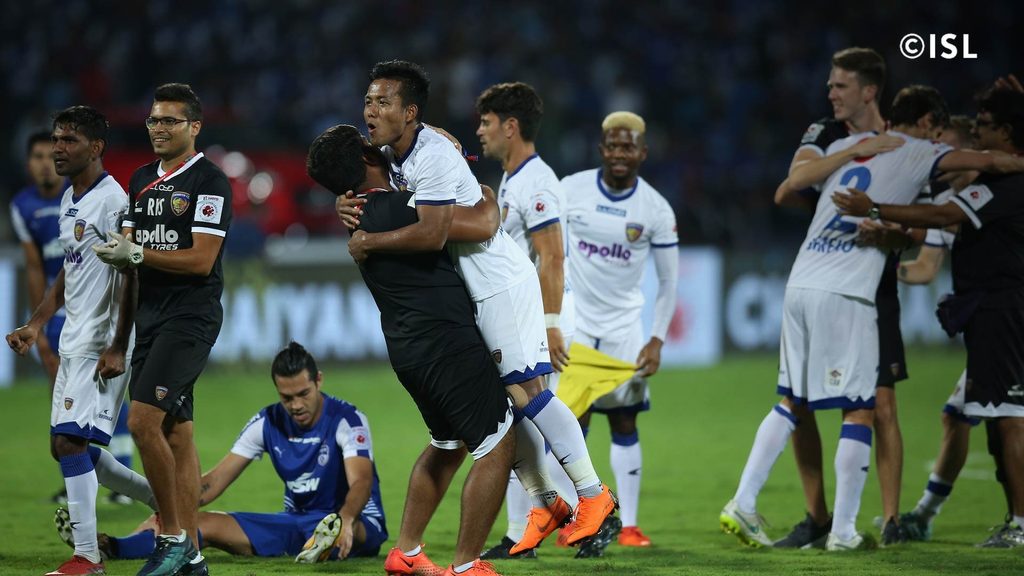With new star on the badge, constellation Bengaluru prove their 'serial winners' tag
Ever since their inception back in 2013, winning has been more of a habit than a requirement for Bengaluru FC.

Ever since their inception back in 2013, winning has been more of a habit than a requirement for Bengaluru FC. Even before their grand entrance in the Hero Indian Super League (Hero ISL) back in the 2017-18, the Blues had themselves well-established as the serial winners of Indian football. There was a lot of buzz surrounding Bengaluru's induction in the Hero ISL and for good reason. After all, the team had won everything else they had the opportunity to win in Indian football - the Hero I-League in 2013-14 and 2015-16, the Federation Cup in 2014-15 and 2016-17.
Replicating the success in the Hero ISL, however, was a whole different ball game altogether with the level of competition raised a notch higher. But that didn't stop the Blues from racing off the blocks in their inaugural season in their quest for the biggest prize in Indian football. Helmed by Albert Roca, Bengaluru finished the league stage at the top of the table and breezed past the semi-finals with authority. Going into the final at their own home ground against Chennaiyin FC, the Blues were considered overwhelming favourites to win the title. But the uncertainty of football, especially in finals, more often than not ends up ignoring pre-conceived perceptions with the spoils going to whoever seizes the day. Despite taking an early lead, the Blues slumped to a heart-breaking defeat in their final hurdle last season.

For the all-conquering Bengaluru side, the loss would go on to become one of the bitterest pills they had to swallow in their short yet eventful history. The team did bounce back immediately by winning the Hero Super Cup, but the niggling irritation of the unrequited success was everpresent in the background.
The added zeal and motivation to set things right was there for everyone to see right from the beginning of this campaign. Under new head coach Carles Cuadrat, who was the assistant coach of the team under Roca last season, the Blues presented a much more ruthless front this time around. Roca's possession-based easy-on-the-eye style was replaced by Cuadrat's pragmatic approach with the singular focus on winning. That didn't mean the Blues would be overcautious and defensive in their approach. In fact, on their day, Bengaluru were absolutely scintillating to watch.
However, what had changed since last season was their reaction during the odd off days at the office. When backed to the wall, this season's Bengaluru, time and again, found a way to grind out a result - a trait which, perhaps, was missing last term. A closer look at the final gives the perfect instance of the very same quality. Failing to score from some good chances, Goa dominating the possession in the second half, Miku's shot coming off the bar - the narrative seemed to be dictating that, yet again, it might not be the Blues' day. But the team showed extraordinary resilience to hang on and eventually persevered at the end.
The added mental fortitude is definitely something the team had worked on pre-season and during the campaign. But one can only wonder if the team's raw resolve to avoid the repetition of last season's disappointment changed the course of fate on the night of the final.
It's beyond any doubt that Cuadrat and the star-studded team were phenomenal this term. But maybe, just maybe, the biggest credit is due to the club culture which exudes the insatiable hunger to win, to persevere, to give it all for the badge and even more to reclaim its honour. A culture, which is now crowned by three stars on the team crest in just six years of existence.
Bengaluru, put a smile on your face, because we've put another star on that crest! #SixInSix #WeAreBFC pic.twitter.com/PPpERR6eKn
— Bengaluru FC (@bengalurufc) March 17, 2019
For anyone following the team closely, the 'never again' message was reflected in the team's actions on and off the pitch throughout the Hero ISL 2018-19 season - a burning testimony to why Bengaluru are Indian football's most ruthless serial winners. To reflect, this isn't the first time Bengaluru have pulled off something like this. After losing their Hero I-League title to Mohun Bagan on the last day of the 2014-15 season, the Blues came back to reclaim their title in a similar fashion in the next campaign. The Blues 'always' go marching on.

























